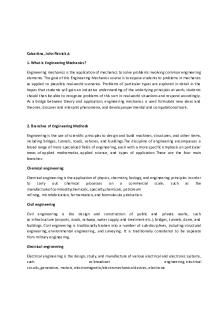Albert Adler Theory of Personality all the basic terms and definition PDF

| Title | Albert Adler Theory of Personality all the basic terms and definition |
|---|---|
| Course | AB Psychology |
| Institution | Messiah College |
| Pages | 2 |
| File Size | 147.5 KB |
| File Type | |
| Total Downloads | 48 |
| Total Views | 150 |
Summary
Theory of Personality of Albert Adler all the basic terms and definition...
Description
-Albert Adler
The goal of the human soul is conquest, perfection, security, superiority. Every child is faced with so many obstacles in life that no child ever grows up without striving for some form of significance
Individual Psychology In Adler’s view, each of us is primarily a social being. Our personalities are shaped by our unique social environments and interactions, not by attempts to satisfy biological needs. Inferiority Feelings: The Source of All Human Striving inferiority feelings (real or imagine) are a constant motivating force in all behavior. “To be a human being means to feel oneself inferior,” Because this condition is common to all of us, then, it is not a sign of weakness or abnormality The Inferiority Complex People with an inferiority complex have a poor opinion of themselves and feel helpless and unable to cope with the demands of life Causes of Inferiority Complexes An inferiority complex can arise from three sources in childhood: organic inferiority, spoiling, and neglect. Organic Inferiority defective parts or organs of the body shape personality through the person’s efforts to compensate for the defect or weakness Spoiling or pampering a child can also bring about an inferiority complex. Spoiled children are the center of attention in the home. Their every need or whim is satisfied, and little is denied them Neglecting Their infancy and childhood are characterized by a lack of love and security because their parents are indifferent or hostile. As a result, these children develop feelings of
worthlessness, or even anger, and view others with distrust. Indeed, today, neglect has come to be considered a major form of child abuse Striving for Superiority, or Perfection striving for superiority as the fundamental fact of life. Superiority is the ultimate goal toward which we strive. He did not mean superiority in the usual sense of the word, nor did the concept relate to the superiority complex. Striving for superiority is not an attempt to be better than everyone else, nor is it an arrogant or domineering tendency or an inflated opinion of our abilities and accomplishments. Fictional Finalism The idea that there is an imagined or potential goal that guides our behavior (subjective final goal or guiding self-ideal to describe this concept, but it continues to be known as “fictional finalism”) The Style of Life A unique character structure or pattern of personal behaviors and characteristics by which each of us strives for perfection. Basic styles of life include the dominant, getting, avoiding, and socially useful types. - The dominant type displays a dominant or ruling attitude with little social awareness. Such a person behaves without any regard for other people. - The getting type (to Adler, the most common human type) expects to receive satisfaction from other people and so becomes dependent on them - The avoiding type makes no attempt to face life’s problems. By avoiding difficulties, the person avoids any possibility of failure. The Creative Power of the Self The ability to create an appropriate style of life Social Interest Our innate potential to cooperate with other people to achieve personal and societal goals
The Role of the Mother in Developing Social Interest Adler believed that the mother’s role was vital in developing the child’s social interest as well as all other aspects of the personality Birth Order One of Adler’s most enduring contributions is the idea that order of birth is a major social influence in childhood, one from which we create our style of life. Even though siblings have the same parents and live in the same house, they do not have identical social environments. Being older or younger than one’s siblings and being exposed to differing parental attitudes create different childhood conditions that help determine different kinds of personalities...
Similar Free PDFs

Theories of Personality - Adler
- 130 Pages

Allport\'s Theory of Personality
- 8 Pages

Adler\'s Theory of Personality
- 9 Pages

Glossary of Basic Literary Terms
- 4 Pages
Popular Institutions
- Tinajero National High School - Annex
- Politeknik Caltex Riau
- Yokohama City University
- SGT University
- University of Al-Qadisiyah
- Divine Word College of Vigan
- Techniek College Rotterdam
- Universidade de Santiago
- Universiti Teknologi MARA Cawangan Johor Kampus Pasir Gudang
- Poltekkes Kemenkes Yogyakarta
- Baguio City National High School
- Colegio san marcos
- preparatoria uno
- Centro de Bachillerato Tecnológico Industrial y de Servicios No. 107
- Dalian Maritime University
- Quang Trung Secondary School
- Colegio Tecnológico en Informática
- Corporación Regional de Educación Superior
- Grupo CEDVA
- Dar Al Uloom University
- Centro de Estudios Preuniversitarios de la Universidad Nacional de Ingeniería
- 上智大学
- Aakash International School, Nuna Majara
- San Felipe Neri Catholic School
- Kang Chiao International School - New Taipei City
- Misamis Occidental National High School
- Institución Educativa Escuela Normal Juan Ladrilleros
- Kolehiyo ng Pantukan
- Batanes State College
- Instituto Continental
- Sekolah Menengah Kejuruan Kesehatan Kaltara (Tarakan)
- Colegio de La Inmaculada Concepcion - Cebu











